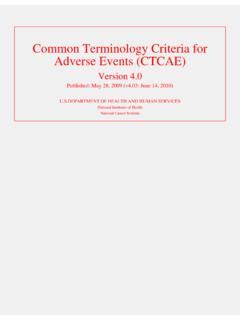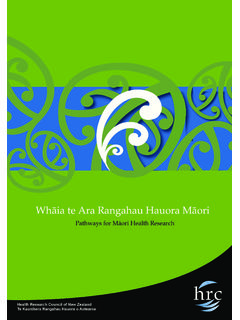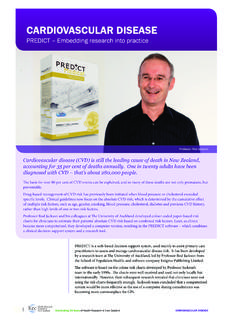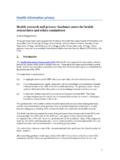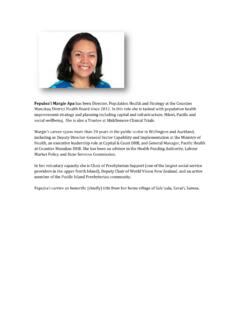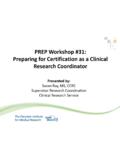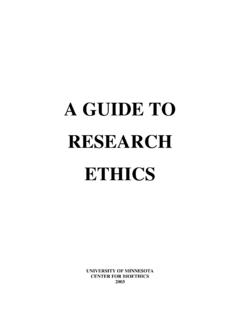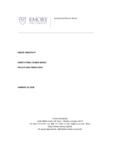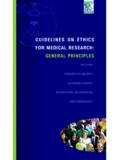Transcription of Te Ara Tika - hrc.govt.nz
1 Te Ara Tika Guidelines for M ori research ethics: A framework for researchers and ethics committee members The P taiora Writing Group Mr Maui Hudson Ms Moe Milne Dr Paul Reynolds Dr Khyla Russell Dr Barry Smith Published by the Health Research Council of New Zealand on behalf of the P taiora Writing Group ISBN: 978%1%877495%03%8 In preparing this document the P taiora1 Writing Group wish to acknowledge Dr Stephanie Palmer, and the support and encouragement of the National Ethics Advisory Committee (NEAC) and, in particular, the input of Dr Polly Atatoa&Carr, the Health Research Council of New Zealand (HRC) and Ng Pae o te M ramatanga, The University of Auckland.
2 1 P taiora is the name used for meetings held by the M ori members of ethics committees Table of Contents Context ..1 Background to the guidelines and the Whakapapa He aha te whakapapa o t nei kaupapa?..6 Tika Me pehea e tika ai t nei kaupapa?..8 Manaakitanga M wai e manaaki t nei kaupapa?..10 Mana Kei a wai te mana m t nei kaupapa? ..12 Glossary of M ori Appendix A: Timeline of developments in M ori research ethics ..20 Appendix B: M ori ethical Appendix C: Characteristics of M ori List of Figures Figure 1: The roles and responsibilities of M ori ethics committee Figure 2: M ori ethical Figure 3: Figure 4: Figure 5: Figure 6: List of Tables Table 1: Assessing appropriateness of M ori 17 Guidelines for M ori research ethics.
3 A framework for researchers and ethics committee members Me whakatika te matatika ki roto i te tikanga kia tika ai Te Ara Tika 1 Introduction This document outlines a framework for addressing M ori ethical issues within the context of decision%making by ethics committee members. It draws on a foundation of tikanga M ori (M ori protocols and practices) and will be useful for researchers, ethics committee members and those who engage in consultation or advice about M ori ethical issues from a local, regional, national or international perspective.
4 Context Research contributes to the broader development objectives of society. Ethics has a specific role in guiding key behaviours, processes and methodologies used in research. International codes of ethics such as the Nuremburg Code (1947)2, the Helsinki Declaration (1964)3, the Belmont Report (1979)4 and, more recently, the UNESCO Universal Declaration on Bioethics and Human Rights (2005)5 shape the changing ethical standards and professional expectations for researchers. These codes have often been developed in response to examples of research that resulted in adverse outcomes and/or experiences for participants and their communities.
5 Despite formal processes and codes of ethics there is ongoing evidence of unethical research practice which highlights the importance of the researcher s own credibility, trust, honesty and integrity vis% %vis6 the research project and participants. Over the years M ori have contributed to the critiques of research practice and advocated for the inclusion of tikanga M ori as part of formal ethical decision%making processes (Appendix A). There are a range of models of M ori research ethics which guide researchers and ensure that tikanga and cultural concepts are acknowledged (Appendix B).
6 The Treaty of Waitangi principles of partnership, participation and protection provide a framework for identifying M ori ethical issues in terms of; rights, roles and responsibilities of researchers and M ori communities; the contribution that research makes towards providing useful and relevant outcomes; and addressing inequalities. All research in New Zealand is of interest to M ori, and research which includes M ori is of paramount importance to M ori. In a research context, to ignore the reality of inter cultural difference is to live with outdated notions of scientific investigation.
7 It is also likely to hamper the conduct of research, and limit the capacity of research to improve human development7. 2 The Nuremberg Code (1947). The Nuremberg Code is made up of ten ethical principles that govern human experimentation 3 Helsinki Declaration (1964). World Medical Association Declaration of Helsinki: ethical principles for medical research involving human subjects. Adopted by the 18th WMA General Assembly, Helsinki, Finland, June 1964, and amended by the 59th WMA General Assembly, Seoul, October 2008.
8 4 Belmont Report (1979). National Commission for the Protection of Human Subjects of Biomedical and Behavioural Research, 5 UNESCO Universal Declaration on Bioethics and Human Rights (2005). United Nations Educational, Scientific and Cultural Organisation (UNESCO) (2005). 6 In relation to 7 National Health and Medical Research Council (2003). Values and Ethics: Guidelines for ethical conduct in Aboriginal and Torres Strait Islander health research. Canberra: 24. 2 Te Ara Tika Tikanga The primary indigenous reference for M ori values and ethics are the creation stories which highlight specific relationships deemed fundamental to the sustainability of life.
9 These relationships are embedded as kawa (primary values) and provide the foundation for the establishment of tikanga. Ethics is about values, and ethical behaviour reflects values held by people at large. For M ori, ethics is about tikanga for tikanga reflects our values, our beliefs and the way we view the world8. Tikanga are locally specific practices that aim to enhance these relationships and ensure the preservation of mana (justice and equity, reflected through power and authority). As the environment changes or new situations arise, tikanga are enacted or adapted to provide context%specific responses.
10 Kawa and tikanga provide the primary interface for accessing repositories of cultural knowledge and experience that can be used to inform ethical deliberations. Tikanga also provides a framework through which M ori can actively engage with ethical issues and consider the effect research may have on their values or relationships. Purpose Articulating the ethical dimensions of tikanga as they relate to particular research proposals is a necessary step to support M ori members of ethics committees to fulfil their kaitiaki (guardian/advocate) responsibilities.
